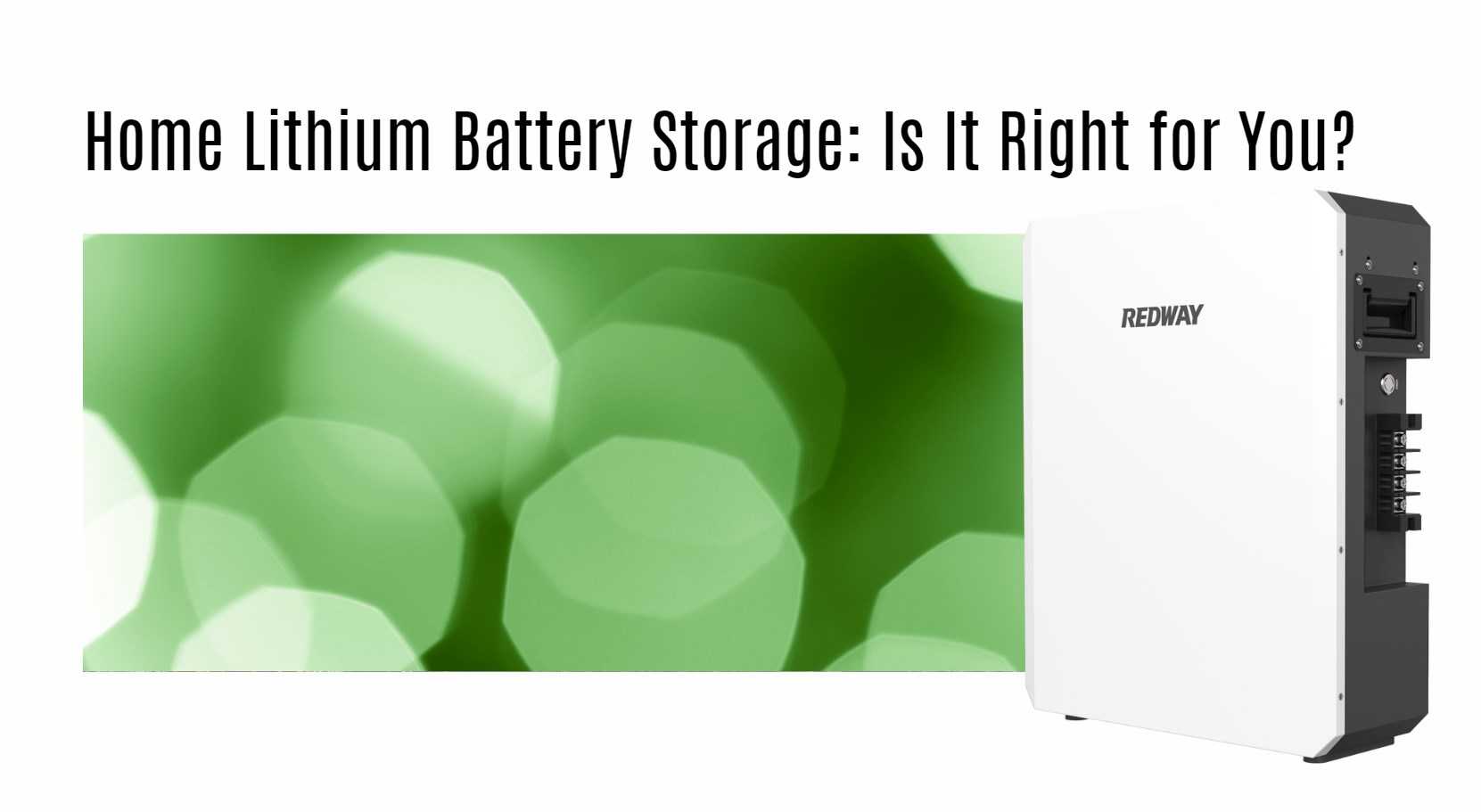-
Benefits of Home Lithium Battery Storage: Home lithium battery storage allows homeowners to save money, reduce energy costs, and decrease their carbon footprint. By storing energy from renewable sources, homeowners can reduce their reliance on the grid, resulting in lower energy bills and a smaller carbon footprint.
-
How to Decide If Home Lithium Battery Storage Is Right for You: To determine if home lithium battery storage is right for you, evaluate your energy usage, goals, and the benefits of increased energy independence and reduced carbon emissions. Consider factors such as high energy bills, frequent power outages, and a desire to reduce your carbon footprint or increase energy independence.
-
How to Prepare for a Lithium Battery Installation: If you decide that home lithium battery storage is right for you, start preparing for installation by researching different battery options, finding the one that best fits your needs and budget. Work with a qualified installer to determine the best location for your battery and ensure safe and proper installation. Proper maintenance is also important to ensure the battery operates efficiently and lasts as long as possible.
Home Lithium Batteries: A Cheery Solution
-
Benefits of Home Lithium Batteries: Home lithium batteries provide a reliable and independent power supply by storing energy from renewable sources like solar panels. They help homeowners save money, reduce energy costs, and contribute to a greener environment by minimizing reliance on the grid and optimizing energy usage.
-
Versatility in Power Supply: Home lithium batteries offer backup power during outages, ensuring uninterrupted electricity supply for essential appliances and devices. They also optimize energy usage by storing excess energy generated during low-demand periods and releasing it during peak demand, reducing the reliance on expensive grid power.
-
Advancements in Technology: With advancements in technology, home lithium batteries are becoming more affordable, durable, and efficient. The cost of lithium batteries has been declining, making them a viable option for homeowners. Additionally, improvements in battery management systems and safety features enhance the overall performance and reliability of home lithium batteries.
Save Money and the Planet with Lithium
-
Benefits of Lithium-ion Batteries: Lithium-ion batteries have become essential for storing and utilizing clean power from renewable energy sources. By using lithium-ion batteries, individuals can save money on energy costs by reducing their reliance on fossil fuels. Additionally, these batteries power electric vehicles, offering a sustainable and cost-effective alternative to traditional gasoline-powered cars.
-
Challenges of Lithium Mining: The increasing demand for lithium has led to a boom in mining exploration worldwide. However, there are concerns about the environmental impact of lithium extraction, including water usage, soil degradation, and biodiversity loss. It is crucial to ensure responsible mining practices and minimize the negative effects on the environment.
-
Responsible Energy Transition: Striking a balance between meeting the growing demand for lithium and protecting the environment is essential for a sustainable energy transition. This includes investing in research and development for alternative battery technologies, promoting recycling and reuse of batteries, and supporting circular economies that reduce waste and environmental impact.
How to Decide If Lithium Battery Storage Is Right for You
-
Evaluate Your Energy Needs: Assess your energy usage patterns, high energy bills, and frequency of power outages to determine if lithium battery storage can address your energy needs effectively.
-
Benefits of Increased Energy Independence: Consider the benefits of reducing reliance on the grid and increasing energy independence. Lithium battery storage allows you to store energy from renewable sources like solar panels and use it when needed, reducing energy costs and carbon emissions.
-
Research Different Lithium Battery Options: Explore different lithium battery options, considering factors such as energy capacity, battery lifespan, safety features, and cost. Research reputable manufacturers and suppliers to ensure you choose a reliable and high-quality lithium battery.
Get Ready to Power Up Your Home with Lithium Batteries!
If you have decided that home lithium battery storage is right for you, it’s time to start preparing for installation. First, you should research different battery options to find the one that best fits your needs and budget. You should also work with a qualified installer who can help you determine the best location for your battery and ensure that it is installed safely and correctly. Finally, you should be sure to maintain your battery properly to ensure that it operates efficiently and lasts for as long as possible.
Home lithium battery storage offers a bright solution for homeowners who are looking to reduce their energy costs and decrease their impact on the environment. By evaluating your energy needs and working with a qualified installer, you can prepare for a lithium battery installation and start enjoying the benefits of increased energy independence and reduced carbon emissions. So why not power up your home with lithium batteries and start enjoying a brighter, greener future today?
Wholesale lithium golf cart batteries with 10-year life? Check here.
FAQs
Is it safe to have lithium batteries in your house?
-
Risks of Storing Lithium Batteries Indoors: Storing lithium batteries indoors poses risks such as fire hazards, release of toxic gases, and short circuits. Mishandling or improper storage can lead to overheating, combustion, and the potential release of harmful chemicals.
-
Safety Precautions for Storing Lithium Batteries: To ensure safety, store lithium batteries in a cool, dry place away from flammable materials and direct sunlight. Regularly inspect the batteries for any signs of damage or leakage. Follow manufacturer’s guidelines for storage and disposal, and never mix different types or sizes of batteries together.
Is a home battery worth it in the UK?
-
Increased Energy Independence: Home battery systems allow homeowners to generate and store their own energy, reducing reliance on the grid and increasing energy independence. This can lead to potential cost savings and a more sustainable energy usage.
-
Protection Against Power Cuts: With a home battery system, you can ensure that essential appliances and devices remain powered during power cuts. This provides peace of mind and ensures continuity of important functions in your home.
-
Earn Money by Supporting the Grid: Homeowners can participate in demand flexibility programs and earn money by supporting the grid. By adjusting energy consumption during peak times, you can contribute to grid stability and earn financial incentives.
-
Maximizing Solar Power Usage: Home battery systems allow for the efficient use of solar power. Excess energy generated during the day can be stored in the battery system and used at night, reducing reliance on the grid and maximizing the benefits of solar panels.
What are the negatives of a lithium battery?
-
Environmental Impact: The extraction process for lithium can result in deforestation, habitat destruction, and the contamination of water sources with toxic chemicals. Proper management and responsible sourcing practices are essential to minimize these environmental impacts.
-
Health Risks: The production and mishandling of lithium batteries can expose workers to toxic materials, leading to respiratory problems, skin irritations, and allergies. Improper disposal can also pose risks to human health and contaminate soil and water sources. Strict safety measures and proper recycling programs are crucial in mitigating these health risks.
-
Safety Concerns for Users: Users of lithium batteries need to be aware of safety precautions. The risk of overheating, explosion, and fire exists if batteries are damaged or exposed to extreme temperatures. Additionally, the use of counterfeit or low-quality batteries can increase the likelihood of malfunctions and hazardous leaks. Responsible purchasing and proper disposal practices are important to ensure user safety.
How common is lithium battery fire?
-
Frequency of Lithium Battery Fires: Data shows that lithium-ion battery fires have experienced a significant increase, with a 46% rise between 2022 and 2023. This highlights the importance of addressing the risks associated with lithium batteries.
-
Causes of Lithium Battery Fires: Lithium battery fires can be triggered by factors such as thermal runaway, physical damage, overcharging, and exposure to high temperatures. These factors can lead to the release of toxic gases and pose significant dangers.
-
Importance of Preventive Measures: Due to their high energy density, lithium battery fires can be particularly dangerous and challenging to control. Implementing safety measures such as proper storage, handling, and charging practices, as well as regular inspections, is crucial to minimize the risk of fires and protect both individuals and property.
Can lithium batteries affect your health?
-
Safety of Lithium Batteries: Lithium batteries, especially with advancements in technology, are generally safe when used and maintained correctly. Integrated battery management systems (BMS) and improved internal chemistries contribute to their safety.
-
Proper Handling and Usage: To ensure the safe usage of lithium batteries, it is important to handle them properly and follow recommended guidelines for charging, storage, and transportation. Mishandling or damaging the batteries can increase the risk of safety incidents.
-
Minimizing Health Risks: By adhering to safety practices and precautions, potential health risks associated with lithium batteries can be minimized. This includes avoiding exposure to toxic materials, preventing thermal runaway, and following proper disposal methods.
How do you stop a lithium battery fire at home?
-
Buying from Reputable Retailers: Purchase devices and replacement batteries only from reputable retailers to ensure their quality and safety. Avoid third-party sellers on online marketplaces, as their products may not undergo rigorous testing requirements.
-
UL-Certified Devices: Opt for UL-certified devices, which have been tested and certified for safety. This ensures that the devices meet the necessary standards and adhere to strict safety guidelines.
-
Safe Charging Practices: Avoid leaving batteries unattended while charging, especially overnight or when away from home. Prevent overcharging by removing the device from the charger once it has reached a full charge. Always use the manufacturer’s charger and avoid using off-market charging equipment.
-
Proper Storage and Inspection: Store and charge devices in fire-resistant containers in a cool, dry place. Regularly inspect batteries for any signs of cracking, bulging, or leaking. If any damage or abnormalities are detected, stop using the device or battery immediately.






